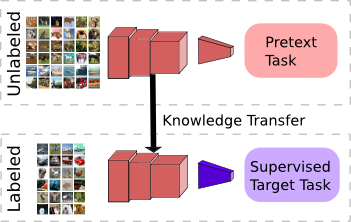Seminar: Learning with Limited Supervision
Prof. Dr. Abhinav Valada
Co-Organizers:
Dr. Simon Bultmann, Iman Nematollahi, Nick Heppert, Iana Zhura
Deep learning has become a key enabler of real world autonomous systems. While classical supervised learning methods typically rely on ground truth information, the area autonomous robotics requires less dependence on manual supervision. The research directions of semi- and self-supervised learning instead aim to learn representations without explicit and potentially even manual supervision. Especially, the domain of robot learning requires scaling to large amounts of unlabeled data in a lifelong manner. Self- and semi-supervised learning already have had a significant impact on fields such as perception, state estimation, control, or graph representation learning, thereby making important progress in object manipulation, scene understanding, visual recognition, object tracking, and learning-based control, amongst others. In this seminar, we will study a selection of state-of-the-art works that propose deep learning techniques for tackling various challenges in autonomous systems. In particular, we will analyze contributions in architecture design and learning paradigms in the areas of computer vision, reinforcement learning, imitation learning, and deep graph learning.

Course Information
|
Details:
|
Course Number: 11LE13S-7310-M
Places: 12
Location: Georges-Köhler-Allee 80, Room Number 00.021
|
|
Course Program:
|
Introduction: 24/04/2025 @ 10:00
How to make a presentation: 27/06/2025 @ 10:00
Block Seminar: 24/07/2025 @ 09:00 - 17:00
|
|
Evaluation Program:
|
Seminar Presentation: 24/07/2025 @ 9:00 - 17:00
Summary Due Date: 01/08/2025 @ 23:59 CEST
|
|
Requirements:
|
Basic knowledge of Deep Learning or Reinforcement Learning
|
|
Remarks:
|
Topics will be assigned for the seminar via preference voting. If there are more interested students than places, places will be assigned based on priority suggestions of the HisInOne system and motivation (tested by asking for a short summary of the preferred paper). The date of registration is irrelevant. In particular, we want to avoid that students grab a topic and then leave the seminar. Please have a coarse look at all available papers to make an informed decision before you commit.
|
Course Material
|
Google Form:
|
|
|
Slides:
|
Lecture 1: Introduction
Lecture 2: How to Make a Good Presentation |
|
Templates:
|
Additional Information
Enrollment Procedure
- Enroll through HISinOne, the course number is 11LE13S-7310-M.
- The registration period for the seminars are from 22/04/2025 to 28/04/2025.
- Attend the introductory session on 24/04/2025.
- Select three papers from the topic list and complete this form by 28/04/2025.
- Places will be assigned based on the priority suggestions of HISInOne and the student's motivation on 29/04/2025.
Evaluation Details
- Students are expected to prepare a 20-minute long presentation and draft a summary.
- The seminar will be held as a "Blockseminar" on 24/07/2025, 9:00 - 17:00 .
- The slides of your presentation should be discussed with the supervisor two weeks before the Blockseminar.
- The summary should not exceed seven pages (excluding bibliography and images) and is due on 01/08/2025. Significantly longer summaries will not be accepted.
- Ensure you cite all work you use including images and illustrations. Where possible, try to use your own illustrations.
- The final grade is based on the oral presentation, the summary, and participation in the blockseminar.
What should the Summary contain?
The summary should address the following questions:
- What is the paper's main contribution and why is it important?
- How does it relate to other techniques in the literature?
- What are the strengths and weaknesses of the paper?
- What would be some interesting follow-up work? Can you suggest any possible improvements in the proposed methods? Are there any further interesting applications that the authors might have overlooked?
Graded Component Submission
- Save your document as a PDF and directly submit it to your topic supervisor via email.
- The filename should be in the format "FirstName_LastName_X.pdf" where X is the evaluation component (Summary / Presentation).
Topics
-
ZeroMimic: Distilling Robotic Manipulation Skills from Web Videos
Supervisor: Nick Heppert -
Point Policy: Unifying Observations and Actions with Key Points for Robot Manipulation
Supervisor: Nick Heppert -
DemoGen: Synthetic Demonstration Generation for Data-Efficient Visuomotor Policy Learning
Supervisor: Nick Heppert -
SKIL: Semantic Keypoint Imitation Learning for Generalizable Data-efficient Manipulation
Supervisor: Nick Heppert -
Mastering diverse control tasks through world models
Supervisor: Iman Nematollahi -
Genie: Generative Interactive Environments
Supervisor: Iman Nematollahi -
DINO-WM: World Models on Pre-trained Visual Features enable Zero-shot Planning
Supervisor: Iman Nematollahi -
Unified World Models: Coupling Video and Action Diffusion for Pretraining on Large Robotic Datasets
Supervisor: Iman Nematollahi -
SpotLight: Robotic Scene Understanding through Interaction and Affordance Detection
Supervisor: Iana Zhura -
Learning-on-the-Drive: Self-supervised Adaptation of Visual Offroad Traversability Models
Supervisor: Iana Zhura -
IMOST: Incremental Memory Mechanism with Online Self-Supervision for Continual Traversability Learning
Supervisor: Iana Zhura -
Wild Visual Navigation: Fast Traversability Learning via Pre-Trained Models and Online Self-Supervision
Supervisor: Iana Zhura -
VGGT: Visual Geometry Grounded Transformer
Supervisor: Simon Bultmann -
Any6D: Model-free 6D Pose Estimation of Novel Objects
Supervisor: Simon Bultmann -
Resilient Sensor Fusion under Adverse Sensor Failures via Multi-Modal Expert Fusion
Supervisor: Simon Bultmann -
Semantic Library Adaptation: LoRA Retrieval and Fusion for Open-Vocabulary Semantic Segmentation
Supervisor: Simon Bultmann
Questions?
If you have any questions, please direct them to Simon Bultmann before the topic allotment, and to your supervisor after you have received your topic.

